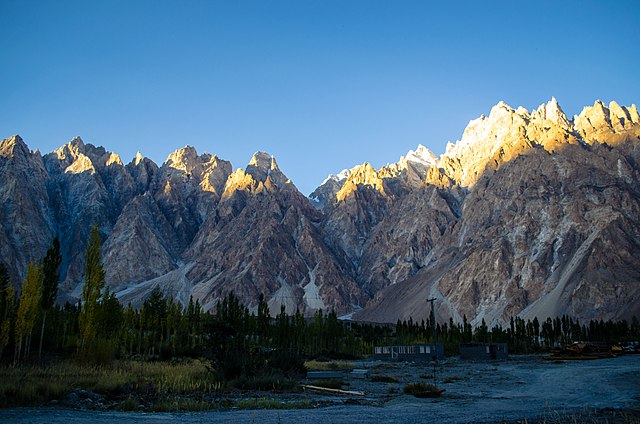Passu Cones (Tupopdan): The Sun-Swallowing Peaks of Hunza – 2025 Travel & Photography Guide
Table of Contents
ToggleUpdated for 2025 by Northern Discover (ND)

“Some mountains demand to be seen. Passu Cones demand to be felt.”
Rising like a crown of spears above the Hunza River, Passu Cones, or Tupopdan (“the sun-swallowing mountain”), are among the most awe-inspiring natural monuments of Gilgit-Baltistan. Their fiery ridgelines catch the dawn like molten gold — a view so surreal that travelers often ask if they’re real.
Located on the Karakoram Highway (KKH) near Passu Village in Upper Hunza, these jagged peaks (reaching 6,106 m / 20,033 ft) have become a symbol of Pakistan’s raw, untamed beauty.
🗺️ Passu Cones: Quick Facts & Location
| Feature | Detail |
|---|---|
| Local Name | Tupopdan — “Sun-Swallowing Mountain” |
| Also Known As | Passu Cathedral, Passu Cones, Hot Mountains |
| Location | Passu Village, Gojal Valley, Upper Hunza, Gilgit-Baltistan, Pakistan |
| Coordinates | 36.5027° N, 74.8873° E |
| Altitude | 6,106 m (20,033 ft) |
| Range | Karakoram Range |
| Best Viewpoints | Karakoram Highway (near Passu Bridge), Husseini Suspension Bridge, Borith Lake Road |
| Famous Nearby Attractions | Passu Glacier, Husseini Bridge, Attabad Lake, Khunjerab Pass |
The Passu Cones form part of the Batura Muztagh subrange, the westernmost cluster of the Karakoram. Their near-perfect symmetry and steep rise from the Hunza River bed make them appear as if carved by divine precision.
📸 The Viewpoint Experience
If there’s one photo every traveler to Hunza must take — it’s the Passu Cones from the Karakoram Highway.
Best Viewpoints & Coordinates
| Viewpoint | Description | GPS / Approx. Distance |
|---|---|---|
| Passu Bridge Viewpoint | Classic postcard view with the river foreground. | 36.5017° N, 74.8925° E |
| Husseini Suspension Bridge | Iconic shot with bridge cables framing the peaks. | 36.5150° N, 74.8899° E |
| Borith Lake Road Curve | Panoramic angle during sunset with soft reflections. | 36.5260° N, 74.8782° E |
| KKH Pull-Off (north of Passu) | Ideal for sunrise time-lapse. | 36.5121° N, 74.8810° E |
Photography Tips (from our experts and locals):
Best time: Sunrise (5:00 – 6:30 am) or sunset (6:00 – 7:15 pm).
Lens choice: Telephoto (70–200 mm) captures the sharp vertical ridges; drone shots offer surreal symmetry.
Weather: The cones appear clearest after early-morning winds.
Insider secret: From Husseini Bridge, wait for the river mist to rise — that’s when Tupopdan glows like “red-hot iron spears.”
🌍 Nearby Must-See Attractions
Exploring Passu Cones is incomplete without visiting the neighboring gems of Upper Hunza — all accessible via short drives on the KKH.
| Attraction | Distance from Passu | Highlight |
|---|---|---|
| Passu Glacier | 3 km | A shimmering white giant meeting the gray Hunza River; visible hike from the village. |
| Husseini Suspension Bridge | 4 km | The world’s most thrilling footbridge — 400 m long and swaying over the river. |
| Borith Lake | 5 km | Calm, glacial lake perfect for reflection photography. |
| Attabad Lake | 30 km | Turquoise lake formed by a landslide in 2010; boat rides available. |
| Khunjerab Pass (Pakistan-China Border) | 80 km | The world’s highest paved border crossing at 4,693 m. |
| Karimabad (Baltit & Altit Forts) | 48 km | The cultural capital of Hunza. |
These attractions form part of the “KKH Loop” itinerary, typically covered in 3–5 days from Hunza to Sost and back.
🚗 Planning Your Visit (Routes, Transport & Costs)
How to Get There
From Islamabad → Passu Cones:
Distance: ~ 710 km
Duration: 16 – 18 hours by road via Karakoram Highway
Route: Islamabad → Chilas → Gilgit → Hunza → Passu
From Gilgit → Passu:
Distance: 150 km
Duration: 3.5 – 4 hours
Route: Gilgit → Hunza (Karimabad) → Ghulkin → Passu
Public Transport Options
| Mode | Cost Range | Details |
|---|---|---|
| Shared Hiace Vans | ₨ 3,000 – ₨ 4,000 (Gilgit–Passu) | Run daily from Gilgit terminal. |
| Private Car/Jeep Hire | ₨ 12,000 – ₨ 18,000 (one-way from Gilgit) | Available via local tour agents. |
| Guided Tours | ₨ 55,000 – ₨ 125,000 (3-9 days) | Includes hotel, guide, and transportation. |
(Tip: Northern Discover offers customized 3- to 9-day tours covering Hunza, Passu, Attabad Lake, and Khunjerab Pass — ideal for small groups.)
🏔️ The Science & Myth of Tupopdan (“Sun-Swallowing Mountain”)
Few know that Tupopdan’s conical shape results from rapid uplift and erosion of the Batura Muztagh rocks — a geologic marvel formed by the collision of the Indian and Eurasian plates.
Locals call them “Hot Mountains” because snow rarely settles on their steep, sun-baked slopes — a phenomenon amplified by their unique mineral composition.
Legends speak of Tupopdan as a mountain that devours the sun each evening, hiding light behind its jagged crown. Travelers and climbers see it as a symbol of power and patience — still unclimbed and shrouded in mystery.
🥾 Trekking, Climbing & Adventure Around Passu
While the cones themselves remain unclimbed, the surrounding region is a paradise for trekkers and adventure photographers.
Top Treks Around Passu
| Trek | Duration | Difficulty | Highlight |
|---|---|---|---|
| Passu Glacier Trek | 2 – 3 hrs | Moderate | Access the glacier’s tongue near Passu village. |
| Patundas Meadows Trek | 2 days | Challenging | Viewpoint above Passu Glacier with sweeping vistas of Tupopdan. |
| Borith Lake Hike | 1 hr | Easy | Gentle ascent with lake & cones backdrop. |
Permits:
For most treks (except near Khunjerab border areas), no special permits are required as of 2025. For professional climbs, NOC from the Alpine Club of Pakistan may be needed.
🏨 Where to Stay & Eat Near Passu Cones
Accommodation
| Property | Price Range | Notes |
|---|---|---|
| Passu Cones Hotel | ₨ 12,000 – ₨ 16,000 | Closest to viewpoint, 9.7 location rating. |
| Reman Backpackers Inn | ₨ 4,000 – ₨ 6,000 | Budget option for trekkers. |
| Glacier Breeze Guest House | ₨ 7,000 – ₨ 9,000 | Scenic views, homely breakfast. |
| Borith Lake Resort | ₨ 10,000 – ₨ 14,000 | Ideal for those seeking serenity. |
Dining
Don’t miss Yak Grill (barbecue specialties) and Glacier Breeze Café (famous for apricot cake).
Local households often serve traditional Hunza dishes — chapshuro, mantu, and daal made with stone-milled grains.
🌦️ Weather & Best Time to Visit
| Season | Temperature Range | Travel Feasibility | Highlights |
|---|---|---|---|
| Spring (Apr–Jun) | 10 – 22 °C | Excellent | Blossoms & moderate temperatures. |
| Summer (Jul–Sep) | 15 – 28 °C | Excellent | Clear skies, perfect for photography. |
| Autumn (Oct–Nov) | 5 – 18 °C | Good | Golden foliage; fewer tourists. |
| Winter (Dec–Mar) | -5 – 10 °C | Limited | Roads may close; surreal snow-framed cones. |
Best time: June – September (ideal weather + accessibility).
Winter travelers: Be cautious of icy roads and limited transport beyond Karimabad.
💡 Travel Tips from Locals
Start your drive from Karimabad early morning to avoid KKH traffic.
Carry cash — no ATMs beyond Gulmit.
Dress in layers — weather changes fast in Upper Hunza.
Respect local customs; photography of people requires permission.
Avoid hiking alone near glaciers due to crevasses.
🔭 Passu Cones in Culture & Imagination
Travelers describe Passu Cones as:
“A cathedral built by nature to humble mankind.”
Artists, vloggers, and bikers (like KamranOnBike) call them the “spiky back of a dragon.”
For locals, the mountain is sacred — a reminder that beauty in the north is both fragile and eternal.
❓ FAQs (Voice-Search Optimized)
Q: Where are Passu Cones located?
A: In Passu Village, Gojal Valley, Upper Hunza, Gilgit-Baltistan, along the Karakoram Highway.
Q: How high are the Passu Cones?
A: The tallest peak, Tupopdan, stands at 6,106 m (20,033 ft).
Q: Can I climb Passu Cones?
A: No successful climbs have been recorded; it’s considered extremely challenging.
Q: What is the best time to visit Passu Cones?
A: Between June and September for clear skies and accessible roads.
Q: How far is Passu from Hunza/Karimabad?
A: Approximately 48 km north — about 1 hour drive along the KKH.
🧭 Suggested Itinerary: 3-Day Passu Adventure
| Day | Plan | Highlights |
|---|---|---|
| Day 1 | Arrive Karimabad → Drive to Passu | Stop at Attabad Lake, Husseini Bridge. |
| Day 2 | Explore Passu Glacier & Borith Lake | Photography + local meal at Yak Grill. |
| Day 3 | Sunrise at Passu Cones → Return | Visit Gulmit village before heading back. |
🎯 Why Passu Cones Should Be on Your 2025 List
One of the most photogenic mountain formations on Earth.
Unmatched combination of adventure, serenity, and culture.
A living symbol of Hunza’s spirit — where every ridge whispers a story of light and stone.
Book or Plan Your Trip with Northern Discover
Want to experience Passu Cones like a local?
👉 Plan your Northern Pakistan adventure with Northern Discover — tailored tours, community stays, and authentic local experiences.
